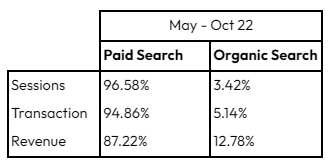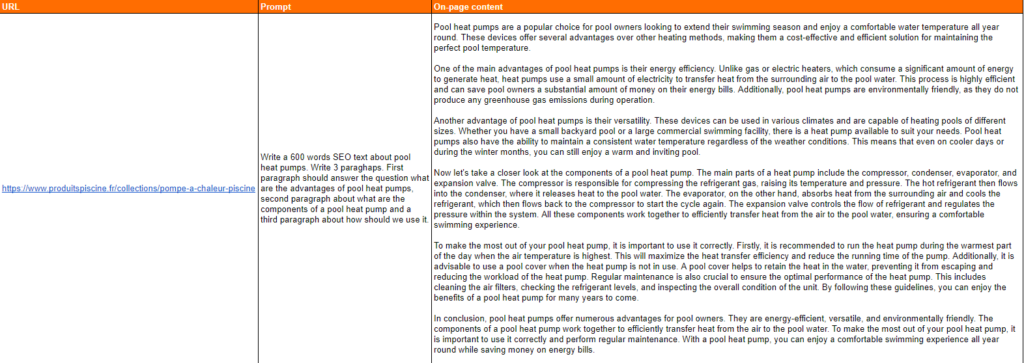In 2023, CLICKTRUST welcomed a new client – a French e-commerce specialist in pool equipment sales. This new digital player recognized the post-pandemic shift in customer behaviour towards online shopping, leading to the creation of their e-shop. The new e-commerce owner initially solely relied on Google Ads for revenue, with a high return on ad spend as a crucial factor.
However, the long-term plan aimed for organic growth. To achieve this, a massive SEO project was put in place to establish a strong foundation for healthier and more cost-effective website traffic.
AI as your new SEO partner
The e-shop was launched mid 2022. Below you can see the performance between Paid Search and Organic Search from May until October 2022 (before we started working with this new client):

With 87,22% of total revenue coming from Paid Channels, sustaining profitability proved extremely difficult for the business.
As their growth partner since early 2023, it was vital to help them gain ground in SEO. The arrival of ChatGPT marked a significant shift in the industry, presenting a game-changing opportunity with the widespread adoption of Artificial Intelligence.
So what exactly have we put in place?
We started with the basics, as we are always used to do:
- A technical audit: Technically speaking, the website performed well, requiring only minor adaptations.
- A visibility analysis: Assessing the website’s visibility and identifying content opportunities
- Keyword research to understand how the pages were ranking for important keywords.
- A content audit: This time, we involved Artificial Intelligence in the content creation for the first time.
In this content audit, two key focus areas were identified:
- Creation of Metadata
- Content creation on every category page
Automated creation of Metadata through a GPT integration in Google Sheets
AI can save us time and resources. To integrate AI efficiently, we adopted a cost-effective mindset, aiming for 100% efficiency in the process.
First, we created metadata for all crucial pages (homepage & category pages) using Google Sheets. To scale and streamline the task, we employed a GPT integration, allowing direct use of ChatGPT and other generative AI models in the spreadsheet. The integration process can be found here.
Once you have understood the power of this feature, things can go very fast. Here is what it looks like:

We used the following formulas to generate numerous metadata in one go:
- Focus keywords: =GPT(“Write 5 focus keywords”,$A2)
- Page title: =GPT(“Write a page title of maximum 60 characters”,$A2)
- Meta description: =GPT(“Write a meta description of maximum 160 characters”,$A2)
Now it’s up to you to build your sheet. Select the pages you need to create content for, drag your formulas and achieve this in less than 5 minutes:

AI significantly reduces the time-consuming task of drafting, but always double-check the outcome. Occasionally, a meta description may need human review before implementation on your website’s backend.
Metadata is the first part of the content audit, helping search engines understand what your webpage is about. However, it’s insufficient for proper indexing and ranking. Additional content is needed on each category page.
Content creation
The eshop covered pretty much every must-have category page, including pumps, heating systems, maintenance products etc. After the first part of the content audit, ChatGPT (3.5) played a crucial role in generating relevant content as well.
We used the same GPT integration in Google Sheets to create this content.

We used the following formulas to generate dedicated texts for each category page:
=GPT(B2,$A2)
It is impressive how much time and money you can save with AI – no need to hire a copywriter.
Now that you have created all the required content, you have it checked by the client, who is likely the person who best understands the business and its features).
We added those texts at the bottom of each category page. Google will start identifying the content and better understand the meaning of the page.
207%
This is the increase Year on Year (YoY) in the proportion of revenue generated organically.
The strategic amalgamation of technical optimizations, AI-driven metadata, and rich content creation resulted in remarkable achievements. This SEO plan was executed in early 2023. YoY, we witnessed a substantial improvement in the website’s SEO performance:

We have gone from 12.78% of revenue generated through Organic to 39.25% (+207%)
When speaking about the actual increase in Organic search performance, YoY we see:
+176% in Organic Sessions
+300% in Organic Transactions
+427% in Organic Revenue
+22% in Authority score
Conclusion
Our collective success story exemplifies the potential of an AI-powered SEO strategy. By addressing technical, content, and authority aspects, we not only increased organic traffic but also significantly reduced our dependency on paid channels for revenue generation. This journey reflects our shared dedication to staying ahead in the industry and achieving concrete outcomes.
Get our ramblings right in your inbox
We deepdive into hot topics across digital marketing and love to share.

